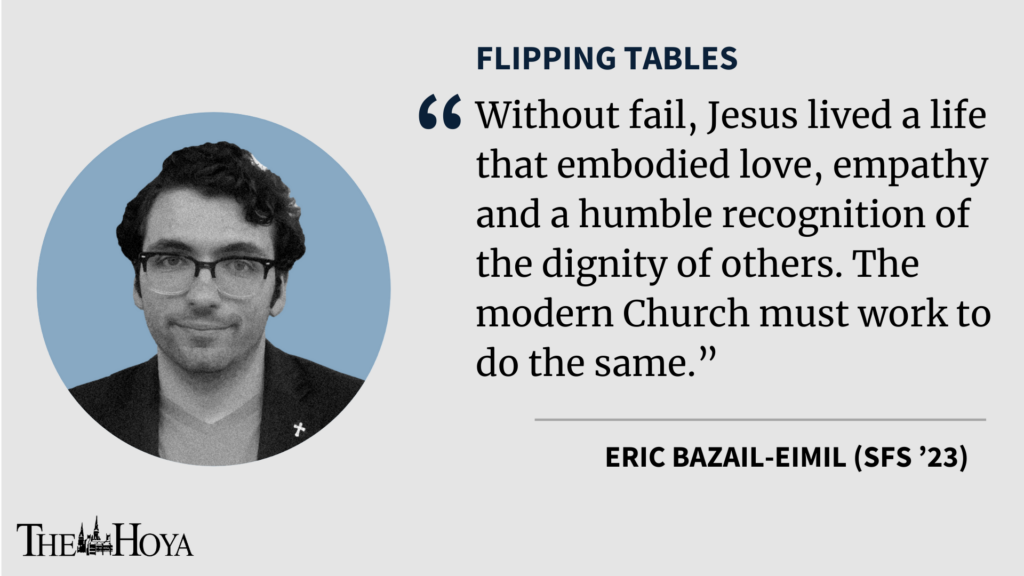In the Gospels, Jesus enters the temple in Jerusalem and sees the Pharisees have allowed moneylenders and exchangers to set up tables in the temple courtyard. Infuriated by this degradation of the sacred space by the presence of “thieves and robbers” and the hypocrisy of the temple leaders who both condemned and profited from this sin, Jesus forcefully turns the tables over to cleanse the temple grounds (John 10:8). Jesus took bold action to demand that faith leaders uphold standards of righteousness in the face of greed, setting a precedent to always challenge religious authority when it falters.
After reflecting on my own faith and my relationship with the Christian — and more specifically, Catholic — Church, I’ve come to ask myself if our Church is due for some table-flipping. After all, there can be no denying that American Christianity is at an inflection point as Christians growingly feel disconnected from their churches and the out-of-touch rhetoric spewed from the pulpit. According to recent data from the Pew Research Center, four in 10 American millennials identify as “religiously unaffiliated,” the largest proportion of young Americans to do so in the nation’s history. The same study also found that there are the fewest Americans identifying as Christian across all denominations and demographics today since Pew began tracking this data over 70 years ago.
Given the resounding institutional failures of Christianity today, the growing number of Americans leaving the Church should come as no shock. From avaricious pastors who have exploited their parishioners for their own financial benefits to the rampant sexual abuse within the Catholic Church and the venomous and deadly rhetoric directed toward LGBTQ+ people, modern Christianity often resembles the actions of the Pharisees Jesus resisted far more than it resembles the life and teachings of Jesus himself. Christianity has also resisted reform time and time again, with many denominations restricting ministerial opportunities for female-identifying congregants.
Modern Christianity often downplays the groundbreaking nature of Jesus’ life and ministry on earth, but as the late Christian writer Rachel Held Evans once observed, “What makes the gospel offensive isn’t who it keeps out, but who it lets in.” Indeed, Jesus lived a life of radical compassion and inclusion, one that directly challenged the biases and elite detachment of the Pharisees and Sadducees who dominated Jewish religious life at the time. Churches talk at length about the importance of evangelization and the mission to spread the Gospel around the world, but equally important to evangelization is the creation of a Church that lives up to and leans into Jesus’ groundbreaking, inclusive and subversive ministry.
There are several instances from the Gospels in which Jesus exemplifies inclusivity and compassion. At a desert well in John 4, Jesus defies social convention as a male religious teacher by speaking directly to a Samaritan woman, eventually moving her heart such that she became one of the faith’s first woman preachers. In John 8, Jesus defended an adulterous woman from being stoned, upholding the value of merciful justice by extending her forgiveness for her sins. And throughout the Gospels, Jesus welcomes tax collectors, sex workers and others who were considered dirty and lowly in Judean society. Without fail, Jesus lived a life that embodied love, empathy and a humble recognition of the dignity of others. The modern Church must work to do the same.
Building a more welcoming, inclusive Christian Church will not be easy, but then again, when has flipping tables ever been easy? More than ever, Christianity needs a cleansing, one that starts by challenging authority and asking critical questions about how our faith realizes its work. Join me over the next few weeks as we flip a few tables, demand a Church that lives up to the ideals represented in Jesus’ life and welcome back those who have been excluded in the past.
Eric Bazail-Eimil is a junior in the School of Foreign Service. Flipping Tables appears online every other week.















concerned • Jun 30, 2021 at 6:25 am
Inclusivity doesn’t mean contradicting biblical truths.
Of course, anyone is welcome in a house of the lord but you bet they’ll hear his truths.